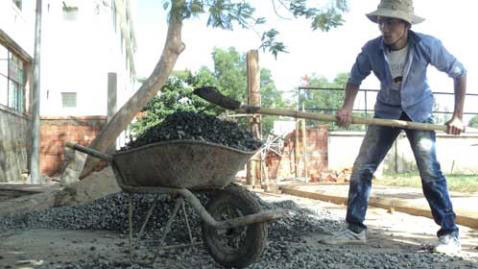Vietnam urged to export workers with master's and PhDs
Wednesday, 10:44, 23/09/2015
With the qualifications of Vietnamese scientists, Vietnam is capable of exporting highly qualified workers, analysts say.
Reports in the international press show that Japan is offering thousands of jobs in some fields and cannot find candidates is good news for Vietnam, where the unemployment rate is increasing.
If so, why doesn’t Vietnam export workers to Japan?
Le Van Banh, head of the Mekong River Delta Rice Institute, said Japan is a demanding market which only accepts skilled and highly qualified workers.
Meanwhile, most Vietnamese workers are unskilled and untrained.
Vietnamese businesses complain they cannot find enough skilled workers. Some enterprises in Binh Thuan and Khanh Hoa provinces have hired Chinese workers because they cannot find capable workers in their localities.
The problem, according to Banh, is Vietnamese education. Vietnamese schools prefer less costly and ‘fashionable’ training majors such as finance & banking and business administration to majors that require high costs and many practice hours.
Nguyen Ngoc De from Can Tho University, who spent four years to earn a doctorate in Japan, agreed that the labor shortage in Japan could be a great opportunity for Vietnam, but doubts if Vietnam can grab the opportunity.
According to De, Vietnamese workers leave their workplaces due to bad management. They also have bad foreign language skills. Though Vietnamese workers have won prizes at skills competitions in the region, Vietnamese productivity is still 15 times lower than Singapore's and five times lower than Malaysia's.
Experts think Vietnamese blue-collar workers would not be accepted in Japan, and believe it would be better to think of exporting highly-qualified workers and scientists.
India, they think, could be an example for Vietnam. India never exports factory workers and farmers. It mostly exports scientists, information technology workers, and people with master's and doctor's degrees.
“I am sure Vietnamese scientists’ capability is in no way inferior than the Japanese, though they will have to make great efforts when working in a country like Japan,” De said.
He said that Vietnam should focus on exporting high-quality workers because of the higher value. In general, the pay for highly qualified workers is between US$5,000 and US$6,000 a month.
“Vietnamese doctors’ qualifications are on par with the world’s. Therefore, it would be better to focus on highly qualified exports,” he said.
The latest report released by the Ministry of Education and Training (MOET) showed that by the end of 2013, Vietnam had 633 PhDs working as lecturers at junior colleges (three-year training) and 8,519 PhDs working as lecturers at universities.
If so, why doesn’t Vietnam export workers to Japan?
Le Van Banh, head of the Mekong River Delta Rice Institute, said Japan is a demanding market which only accepts skilled and highly qualified workers.
Meanwhile, most Vietnamese workers are unskilled and untrained.
Vietnamese businesses complain they cannot find enough skilled workers. Some enterprises in Binh Thuan and Khanh Hoa provinces have hired Chinese workers because they cannot find capable workers in their localities.
 |
The problem, according to Banh, is Vietnamese education. Vietnamese schools prefer less costly and ‘fashionable’ training majors such as finance & banking and business administration to majors that require high costs and many practice hours.
Nguyen Ngoc De from Can Tho University, who spent four years to earn a doctorate in Japan, agreed that the labor shortage in Japan could be a great opportunity for Vietnam, but doubts if Vietnam can grab the opportunity.
According to De, Vietnamese workers leave their workplaces due to bad management. They also have bad foreign language skills. Though Vietnamese workers have won prizes at skills competitions in the region, Vietnamese productivity is still 15 times lower than Singapore's and five times lower than Malaysia's.
Experts think Vietnamese blue-collar workers would not be accepted in Japan, and believe it would be better to think of exporting highly-qualified workers and scientists.
India, they think, could be an example for Vietnam. India never exports factory workers and farmers. It mostly exports scientists, information technology workers, and people with master's and doctor's degrees.
“I am sure Vietnamese scientists’ capability is in no way inferior than the Japanese, though they will have to make great efforts when working in a country like Japan,” De said.
He said that Vietnam should focus on exporting high-quality workers because of the higher value. In general, the pay for highly qualified workers is between US$5,000 and US$6,000 a month.
“Vietnamese doctors’ qualifications are on par with the world’s. Therefore, it would be better to focus on highly qualified exports,” he said.
The latest report released by the Ministry of Education and Training (MOET) showed that by the end of 2013, Vietnam had 633 PhDs working as lecturers at junior colleges (three-year training) and 8,519 PhDs working as lecturers at universities.
